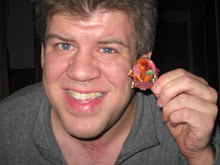Norma Desmond famously asserted in Sunset Blvd. "I AM big. It's the pictures that got small."
Not Morning Glory. This underappreciated gem starts with a small picture - quite literally. Director Roger Michell (Notting Hill, Changing Lanes) frames the image so that it fills just a small portion of the screen. Then, as the scene progresses, the image gradually expands until it fills the wide movie screen.
That's not only an apt metaphor for a movie about a TV show - it turns out to be an apt metaphor for the movie as a whole, which is smarter than most films of its kind. My colleague Hannah Poturalski agrees, writing,
"I was so excited to see Morning Glory, and it was way better than I thought it would be. The plot became increasingly interesting as the film went on and didn’t feel as stale as typical rom-coms."
After workaholic TV producer Becky (Rachel McAdams) gets canned from her longtime job at a local news program, she finds another position in New York, but its not exactly dreamy. It's producing the lowly fourth-place morning show that's behind "whatever the CBS show is called," as her acerbic producer (Jeff Goldblum) puts it.
Becky struggles initially, with most people telling her she'll quit or be fired. Everyone else has. But she hits on a brainwave. She fires the jackass male anchor and decides to hire her hero, news anchorman Mike Pomeroy (Harrison Ford), who alienates everyone he meets. He wants nothing to do with the morning show. When Becky pitches him the job, he caustically responds, "Half of your audience has lost the remote, and the other half is wating for the nurse to turn them over."
That kind of sharp dialogue by writer Aline Brosh McKenna (The Devil Wears Prada) helps Morning Glory rise above most of what passes for rom-com these days, but not all of McKenna's writing is so smart.
The movie's worst fault is that McKenna tries to shoehorn in a romance between Becky and one of her co-workers played by Patrick Wilson. It feels forced; it seems to be there just because these movies are "supposed" to have a "hot" romance. As Hannah puts it:
"Patrick Wilson (Hard Candy) played the love interest, and while he was dreamy, his character was weak and one-dimensional. I hated how he and Becky’s relationship went straight to sex and didn’t seem to have any depth."
Besides, Morning Glory didn't need that relationship at all. It already had a romance, just not a sexual one. The relationship between Becky and Mike is the heart of the picture. Ford and McAdams have great chemistry together. Their characters' personalities are quite different, but both are devoted to being tops in their fields, and they bring out the best in each other. The other key anchor, played by Diane Keaton, gets somwhat overshadowed, but she still has some fun momets as her character softens from a hard-bitten cynic to a fun-loving reporter.
For Hannah and myself, the picture resonated for personal reasons. Being an entertainment editor, I have often felt the uncomfortable push-pull between entertainment and news. Hannah, who is a relatively new reporter, writes:
I liked most of the movie taking place in the work area. It made it harder for characters to reveal their true selves because they had to act in a professional setting. But then they grew together like a family and were able to be informal and caring. I thought the mix of characters was awesome because you never know what kind of personality you will meet at a new job.
Morning Glory has been somewhat overlooked as the holiday juggernaut snowballs, but those who discover it just may find it to be a welcome ray of sunshine.
Read Hannah's full take here.


No comments:
Post a Comment